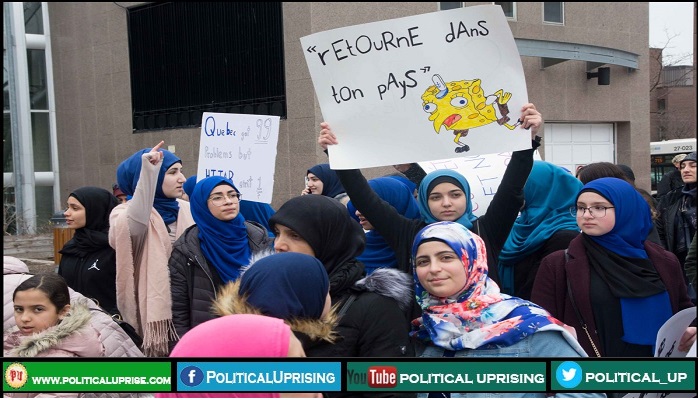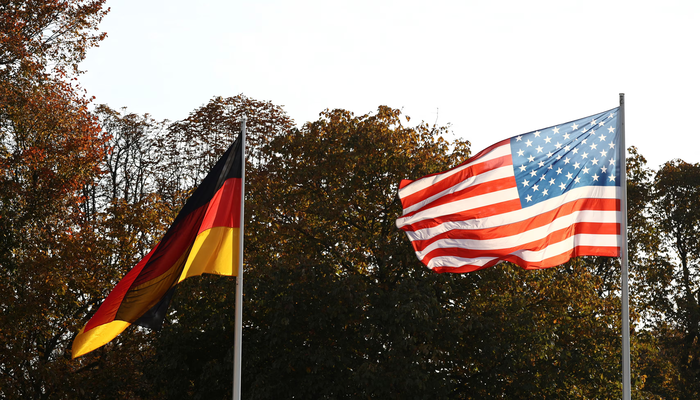Quebec court is set to hear a motion that seeks to suspend the application of a law that prohibits some public-sector employees to wear religious symbols.
Quebec’s Bill 21 prohibits some public employees from wearing religious symbols, such as hijab or kippas, at work.
The Quebec Court of Appeal will hear the request for a stay on Bill 21, as the law is widely known, on Tuesday.
Bill 21 bars public-sector employees in positions of authority such as school teachers and principals, prosecutors and police officers from wearing religious symbols in the workplace.
That includes the hijab worn by Muslim women, kippas worn by Jewish men, and turbans worn by Sikh men and women, among other things.
“We are standing against second-class citizenship,” said Mustafa Farooq, executive director of the National Council of Canadian Muslims (NCCM), on the steps outside the Montreal court before the hearing.
NCCM and the Canadian Civil Liberties Association (CCLA), as well as Quebec teaching student Ichrak Nourel Hak challenged Bill 21 shortly after the legislation was passed in June.
The groups lost an attempt to suspend the law’s application in Quebec Superior Court in July, but they were given a chance to appeal that decision.
“The fact that a person wearing a kippa can’t become a teacher in Quebec in 2019 is a disgrace to this province’s proud tradition of defending its fundamental freedoms,” Farooq said during a news conference on Tuesday.
The Quebec government has defended Bill 21, saying it seeks to enshrine the importance of state secularism in provincial law a concept known as laicite in French.
The law also has the support of a majority of Quebeckers, recent polls show.
But rights groups and civil liberty advocates across Canada say the legislation unfairly disadvantages religious minorities and targets Muslim women, in particular.
The Quebec government invoked a clause in the Canadian Charter of Rights and Freedoms that limits legal challenges to Bill 21 on the basis of religious freedom, among other generally protected rights.
To get around that restriction, the groups before the Quebec Court of Appeal have argued the law is vague, encroaches on federal jurisdiction, and stops citizens from participating in democratic institutions, the Canadian Press reported.
Read More: Jordan finance minister reject new taxes claim in budget
Their full legal challenge against Bill 21 is expected to be heard at a later date in Quebec Superior Court۔
Noa Mendelsohn Aviv, equality programme director at the CCLA, described the law as “unjust, unlawful and unconstitutional”.
“Any law that speaks of symbols, any law that dictates to people, especially to women, what they can and cannot wear is not liberating. It is coercive and oppressive,” she said before the hearing.
“Any law that speaks of symbols that goes after scarves and head-coverings, but really targets people because of their religion, is a human rights violation.”
Bill 21 also faces new legal challenges and widespread rebuke.
Read More: Trump to release ‘Financial Statement’ before next polls
Last month, the largest English-language school board in Quebec filed a separate challenge against the law, saying it violates minority language education rights.
Some major Canadian municipalities, including Toronto and Calgary, have also passed symbolic motions denouncing the legislation.
On Monday, the provincial legislature in Ontario unanimously passed a motion condemning Bill 21 and calling on Premier Doug Ford to ask his Quebec counterpart Francois Legault to repeal it “immediately”.
Legault has defended the law, however, saying it has the support of most people in Quebec and politicians outside of the province should “stay out of it”.
Read More: Netanyahu indicted for bribery and fraud charges
During the recent federal election campaign, Legault also criticised Prime Minister Justin Trudeau for saying a Liberal government would be open to joining a legal challenge against Bill 21.
Quebec court is set to hear motion to freeze religious symbol bill.



